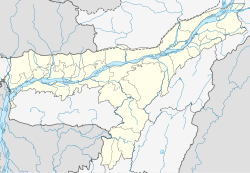Sonari
|
Sonari সোণাৰি |
|
|---|---|
| town | |
| Location in Assam, India | |
| Coordinates: 27°04′N 95°02′E / 27.07°N 95.03°ECoordinates: 27°04′N 95°02′E / 27.07°N 95.03°E | |
| Country |
|
| State | Assam |
| District | Charaideo |
| Government | |
| • Body | Sonari Municipality Board |
| Elevation | 97 m (318 ft) |
| Population (2001) | |
| • Total | 17,430 |
| Languages | |
| • Official | Assamese |
| Time zone | IST (UTC+5:30) |
| ISO 3166 code | IN-AS |
| Vehicle registration | AS 04 |
Sonari (IPA: ˈsəʊnɑːrɪ)(Assamese: সোণাৰি) is a district Headquarter, mid-size town and a municipal board in newly announced Charaideo district ( by Chief Minister Mr. Tarun Gogoi on 15 August 2015) in the Indian state of Assam.
Sonari is located at 27°04′N 95°02′E / 27.07°N 95.03°E. It has an average elevation of 97 metres (318 feet). It is a major town on the nearly 500-year-old "Dhodar Ali" ("Road of the lazy") built by the Ahom Kings. Dhodar ali was forcefully commissioned by Ahom king Gadadhar Singha using the so-called lazy people or the socially unproductive 'Dhods' residing within Assam. Situated by the side of the Taokak river, Sonari is the headquarters of Charaideo subdivision, Sivasagar District, Assam. The nearest railway station is Bhojo, which is about 3 km away located by the bank of historical Disang River. The best way to reach sonari by road is from Sivasagar town through the Dhodar Ali near which the famous royal mausoleum of the Ahom Kings at Charaideo is situated. Sonari is a centre for tea and timber industries and is the gateway to the Mon district of Nagaland.
It is claimed that the original name of Sonari was Sonapur. During the Ahom king's period in 1253 AD, the goldsmiths working for the Ahom royals lived here giving the name of the town(the Assamese word for goldsmith is Sonari). There are even claims that Great Borahi king Mahamanikya (Mahamanifa) lived in Rajadhap area of Sonari during 15th century, in whose court Madhava Kandali translated Ramayana into Assamese before the era of saint Shankardeva. It is also believed that Bhogoniya Raja Jayadwaj Singha rested for days in Sonari before proceeding to Namrup during the invasion of Assam and Ahom capital by Aurangzeb's general Mirjumlah during 1663. One of the first two tea estates set up by Maniram Dewan has now been discovered by Dr Pradip Baruah of the Tocklai Experimental Station of the Tea Research Association. Dewan established the Cinnamara TE at Jorhat and Senglung TE near Suffry, Sonari, around 169 years back, in 1845. Maniram Dewan was the first Indian commercial tea planter.
...
Wikipedia


